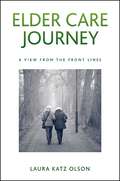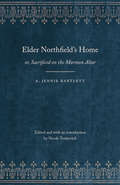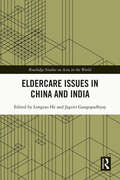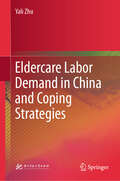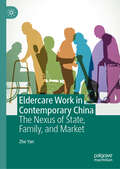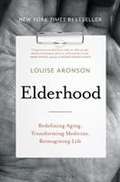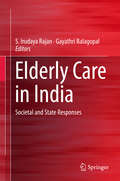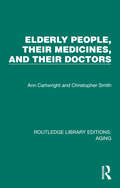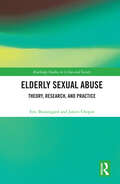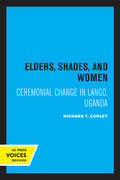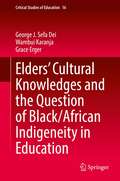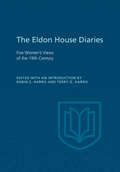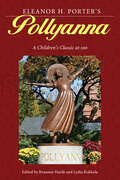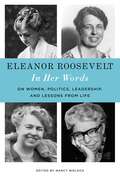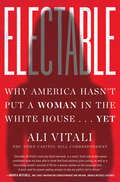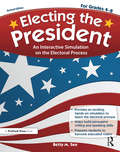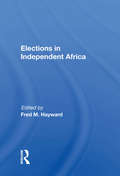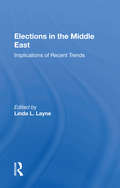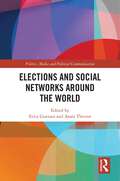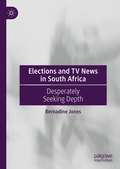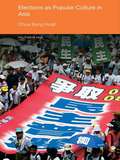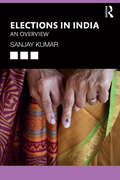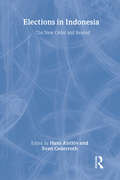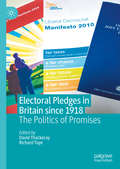- Table View
- List View
Elder Care Journey: A View from the Front Lines (Excelsior Editions)
by Laura Katz OlsonWinner of a Gold Medal, 2017 Living Now Book Award in the Caregiving categoryShortlisted for the 2016 Sarton Women's Book Awards in the Memoir category presented by the Story Circle NetworkFor millions of Americans caregiving is the "new normal." For Laura Katz Olson, a respected researcher of long-term care for the aging, Elder Care Journey chronicles the disruption of her world and how it is upended by the ever-increasing long-distance needs of her own mother.A healthy, Senior Olympics medal winner, Olson's mother is slowly and steadily incapacitated by Parkinson's disease and a gradual loss of vision. Thrust into a long-distance caregiving role, Olson finds her previous academic notions about assisting a frail parent increasingly at odds with the reality of the lived experience. In a narrative full of "ah-ha!" moments, tears, sighs, and outrage that will be familiar to many, Olson opens a window into the nursing home and home care industries that consume much in the way of taxpayer dollars, but often fail to deliver quality care. Olson's personal story vividly demonstrates not only the overwhelming bureaucratic barriers faced by care-dependent seniors but also their beleaguered adult children's attempts to ensure their parents' health, safety, and well-being.
Elder Northfield's Home: or, Sacrificed on the Mormon Altar (Legacies of Nineteenth-Century American Women Writers)
by A. Jennie Bartlett Nicole TonkovichThe practice of plural marriage, commonly known as polygamy, stirred intense controversy in postbellum America until 1890, when the Church of Jesus Christ of Latter-day Saints first officially abolished the practice. Elder Northfield’s Home, published by A. Jennie Bartlett in 1882, is both a staunchly antipolygamy novel and a call for the sentimental repatriation of polygamy’s victims. Her book traces the fate of a virtuous and educated English immigrant woman, Marion Wescott, who marries a Mormon elder, Henry Northfield. Shocked when her husband violates his promise not to take a second wife, Marion attempts to flee during the night, toddler son in her arms and pulling her worldly possessions in his toy wagon. She returns to her husband, however, and the balance of the novel traces the effects of polygamy on Marion, Henry, and their children; their eventual rejection of plural marriage; and their return to a normal and healthy family structure. Nicole Tonkovich’s critical introduction includes both historical contextualization and comments on selected primary documents, providing a broader look at the general public’s reception of the practice of polygamy in the nineteenth century.
Eldercare Issues in China and India (Routledge Studies on Asia in the World)
by Longtao HeThe contributors to this book present case studies of elder care in China and India, and draw comparisons between the two – illuminating some of the key issues facing the two largest Asian countries as they develop rapidly. Caring for the elderly is a major challenge for all countries, and one which is of acute concern for rapidly developing economies. Development tends to run counter to long-established cultural norms of family-based caring and filial piety, even as it also tends to lead to longer life expectancy. Taking a range of methodological and conceptual approaches to understanding these challenges, the contributors present a multifaceted understanding of elder care issues in both India and China. They focus in particular on caregiving within families and at care homes – and the impacts these have on quality of life and the experience of caregiving for both caregivers and the aged themselves. An invaluable collection for scholars and students of gerontology and aging in Asia, that will also be of great interest to scholars with a broader interest in global trends in caregiving.
Eldercare Labor Demand in China and Coping Strategies
by Yali ZhuThis book employs Markov models and propensity score matching methods to analyze the demand for elderly care labor, utilizing data from the China Longitudinal Healthy Longevity Survey (CLHLS) and World Population Prospects 2022 (United Nations, 2022). The model predicts the health transferring scenario among the aging population firstly, and then the demand for elderly care labor from 2022 to 2058 under a fixed care time demand scenario according to 8-hour working system, as well as national and provincial regulations on caregiver-carereceiver ratios. The accelerated aging process and rapid increase in the younger elderly population will result in a rapid increase in the demand for elderly care labor for the healthy elderly until about 2042, with a 1.5-fold increase. This is followed by accelerated growth in the demand for elderly care labor for the impaired and dysfunctional aging population. Over time, the supply of older adults without care will gradually increase, nearly doubling by 2058 compared to 2022. It is recommended that on the one hand, eldercare labor demand in China can be reduced from the origin by improving the health of the population; and on the other hand, the effective supply of elderly care be expanded by building a modern care service system, improving relevant policies, integrating care resources, and innovating the supply model.
Eldercare Work in Contemporary China: The Nexus of State, Family, and Market
by Zhe YanThis book gives voice to an indispensable yet often overlooked group of care workers in China&’s eldercare industry. Drawing on rich, first-hand accounts from frontline care workers and interwoven with a wealth of sociological insights, the author offers a critical yet nuanced analysis of how statutory norms, cultural values, institutional standards, and interpersonal dynamics shape the experiences, motivations, and coping strategies of professional care workers. The book compellingly illustrates the stark contrast between the high expectations and demands placed upon these workers and the low pay and status they receive in return. A key strength of the book lies in its holistic approach, which not only contextualizes the challenges faced by care workers but also explores their search for meaning within an increasingly marketized and rapidly evolving cultural landscape. By shedding light on the intersection of care work, policy, economy and socio-cultural values, the book offers a fresh analytical lens on the precariousness and resilience of care workers. It provides critical insights into how these workers navigate structural constraints, drawing on personal agency and cultural resources to find purpose and dignity in their roles. In doing so, the book makes a significant contribution to debates on labor, aging, and care in contemporary China, offering valuable implications for policymakers, researchers, and practitioners alike.
Elderhood: Redefining Aging, Transforming Medicine, Reimagining Life
by Louise Aronson<p>As revelatory as Atul Gawande's Being Mortal, physician and award-winning author Louise Aronson's Elderhood is an essential, empathetic look at a vital but often disparaged stage of life. <p>For more than 5,000 years, "old" has been defined as beginning between the ages of 60 and 70. That means most people alive today will spend more years in elderhood than in childhood, and many will be elders for 40 years or more. Yet at the very moment that humans are living longer than ever before, we've made old age into a disease, a condition to be dreaded, denigrated, neglected, and denied. <p>Reminiscent of Oliver Sacks, noted Harvard-trained geriatrician Louise Aronson uses stories from her quarter century of caring for patients, and draws from history, science, literature, popular culture, and her own life to weave a vision of old age that's neither nightmare nor utopian fantasy--a vision full of joy, wonder, frustration, outrage, and hope about aging, medicine, and humanity itself. <p>Elderhood is for anyone who is, in the author's own words, "an aging, i.e., still-breathing human being."</p>
Elderly Care in India
by S. Irudaya Rajan Gayathri BalagopalThis volume highlights a range of issues underpinning elder care in India, with particular focus on the challenges that India faces in caring for the elderly. In addition to the very limited state support and near total dependence on the family for long-term social care and economic support, the changing dynamics between generations in the family structure and privatization of health care in general create new challenges that need to be addressed. Although care plays a significant role in the well-being of the elderly, there is not much research available from India. This volume draws on field-based evidence and the legal framework in India to understand the ways in which care is organized for the elderly and to locate the main sources of care provision. The book addresses key themes such as shrinking of traditional support base of the elderly, trajectory of old age homes in India and care arrangements for the elderly within the community. Written by academics and practitioners in the field of gerontology, this book is an informative resource for demographers, gerontologists, social scientists studying aging, and human rights and legal experts working with the aged.
Elderly People, Their Medicines, and Their Doctors (Routledge Library Editions: Aging)
by Christopher Smith Ann CartwrightIn the late 1980s, an increasing proportion of all prescribed medicines went to people over 65 years of age, not only because they constituted a growing sector of the population but also because their consumption rate, unlike that of younger people was increasing. This increase was therefore a matter for widespread concern which had until now been largely speculative, as no recent national survey had focused on this issue.Originally published in 1988, Ann Cartwright and Christopher Smith looked at the medicines prescribed for, and taken by, a nationally representative sample of elderly people. The experiences and views of both patients (elderly people) and professionals (general practitioners) are examined and related. What is revealed is how much, and how little GPs knew about the social circumstances and medicine taking of their elderly patients. Evaluation of all the prescribed medicines taken shows the extent of elderly people’s knowledge of their medication and identifies duplications, potentially harmful interactions, contraindications, and inappropriate dosages. Recommendations for action to be taken by doctors, pharmacists, medical educators, and elderly people themselves made this book essential reading for all those concerned with the health and welfare of elderly people at the time.
Elderly Sexual Abuse: Theory, Research, and Practice (Routledge Studies in Crime and Society)
by Eric Beauregard Julien ChopinThis book offers an analytical review of the state of knowledge on elderly sexual abuse and presents new data that will confront some of the accepted ideas and some of the myths associated with this specific form of sexual violence. Sexual violence research has often considered children to be the most vulnerable population. However, another population just as vulnerable to sexual abuse but often overlooked by researchers, is the elderly. Evidence shows that elderly victims are more likely to be attacked by strangers, most likely to be victimized in their own homes, and are usually less capable of resisting a physical attack. Drawing on a large and representative dataset, Elderly Sexual Abuse offers a full and theoretically informed picture of the offenders and their crimes. In addition to a specific chapter devoted to prevention and criminal investigation, the book also connects research to practice, exploring what the findings mean for professionals working with these cases and the criminal justice system. This book is essential reading for all those engaged with sexual violence, victimization, elder abuse, and vulnerable populations.
Elders, Shades, and Women: Ceremonial Change in Lango, Uganda
by Richard T. CurleyIn Elders, Shades, and Women, Richard T. Curley describes the ceremonial life of a Nilotic community in northern Uganda and traces the alterations in its ceremonial activities from the turn of the twentieth century to the beginning of extensive contact between the Langi and Europeans in the 1960s. Setting his analysis within the broad context of Lango social organization, Curley discusses the makeup of the community and shows how the innovations of the colonial period led to changes in kinship relations and residential patterns. He is particularly attentive to the husband-wife relationship and to the changing status of women within a patrilineal system. After describing Lango social organization and the changes that it has undergone, Curley turns to the three complexes of Lango ceremonial activity. One of these, traditionally performed by older men, has virtually disappeared, a victim of altered political relationships. The second set, comprising eight separate ceremonies performed for married women, concerns the problem of incorporating a women into her husband's lineage while recognizing that she was born in her father's. The third complex, centering on spirit possession, has become increasingly popular, and women participate to a much greater extent than men. The author treats his religious material within the framework of structural-functionalism by concentrating on ceremonial activities rather than on belief and by relating the ceremonies to social processes. He departs from structural-functionalism, however, in borrowing heavily from work on the analysis of symbols, and he attempts to describe change rather than analyzing Lango religious activity at a single point in time. This title is part of UC Press's Voices Revived program, which commemorates University of California Press’s mission to seek out and cultivate the brightest minds and give them voice, reach, and impact. Drawing on a backlist dating to 1893, Voices Revived makes high-quality, peer-reviewed scholarship accessible once again using print-on-demand technology. This title was originally published in 1973.
Elders’ Cultural Knowledges and the Question of Black/ African Indigeneity in Education (Critical Studies of Education #16)
by George J. Dei Wambui Karanja Grace ErgerThis book makes a strong case for the inclusion of Indigenous Elders’ cultural knowledge in the delivery of inclusive education for learners who are members of minority communities. It is relevant to curriculum developers, teachers, policy makers and institutions that engage in the education of Black, Indigenous, Latinx and other minority students. This book provides opportunities for exploring the decolonization of educational approaches. It promotes the synthesis of multiple types of knowledge and ways of knowing by making a case for the incorporation of Indigenous knowledges and Indigenous Elders as teachers in learning spaces. The book is of interest to educators, students, and researchers of Indigenous knowledge and decolonizing education. Additionally, it is important for educational policy makers, especially those engaged in looking for strategic solutions to bridging educational disparities and gaps for Indigenous, Black, Latinx and other minority learners.
Eldon House Diaries: Five Women's Views of the 19th Century
by Robin Harris Terry HarrisEldon House is a distinctive element in the historical townscape of London, Ontario. By the mid-nineteenth century, its original owners, John and Amelia Harris, were prominent members of society in that dynamic community. Their children grew up in the affluent and cultured setting of a family whose increasing prosperity advanced with that of London and western Ontario. If London had an elite, the Harris family was part of it, and Eldon House was an important focal point of the social regimen of the day. A considerable corpus of family papers within the Eldon House and prominent among these papers is a collection of diaries that are excerpted in this volume, encapsulating the personalities, activities, and voices of the Harrises of London. These diaries are valuable because of the details of the warp and woof of daily life in the nineteenth century. But, more importantly, they are women's diaries. As such, they speak to us of the verities of personal, domestic, and societal life in the neglected voice of women. Together, they provide a fascinating perspective of these women's lives in, around, and beyond Eldon House.
Eleanor H. Porter's Pollyanna: A Children's Classic at 100 (Children's Literature Association Series)
by Roxanne Harde and Lydia KokkolaAppearing first as a weekly serial in The Christian Herald, Eleanor H. Porter's Pollyanna was first published in book form in 1913. This popular story of an impoverished orphan girl who travels from America's western frontier to live with her wealthy maternal Aunt Polly in the fictional east coast town of Beldingsville went through forty-seven printings in seven years and remains in print today in its original version, as well as in various translations and adaptations. The story's enduring appeal lies in Pollyanna's sunny personality and in her glad game, her playful attempt to accentuate the positive in every situation. In celebration of its centenary, this collection of thirteen original essays examines a wide variety of the novel's themes and concerns, as well as adaptations in film, manga, and translation. In this edited collection on Pollyanna, internationally respected and emerging scholars of children's literature consider Porter's work from modern critical perspectives. Contributors focus primarily on the novel itself but also examine Porter's sequel, Pollyanna Grows Up, and the various film versions and translations of the novel. With backgrounds in children's literature, cultural and film studies, philosophy, and religious studies, these scholars extend critical thinking about Porter's work beyond the thematic readings that have dominated previous scholarship. In doing so, the authors approach the novel from theoretical perspectives that examine what happens when Pollyanna engages with the world around her—her community and the natural environment—exposing the implicit philosophical, religious, and nationalist ideologies of the era in which Pollyanna was written. The final section is devoted to studies of adaptations of Porter's protagonist.
Eleanor Roosevelt: On Women, Politics, Leadership, and Lessons from Life
by Nancy WolochThis illustrated, first of its kind collection of excerpts from Eleanor Roosevelt's newspaper columns, radio talks, speeches, and correspondence speaks directly to the challenges we face today.Acclaimed for her roles in politics and diplomacy, first lady Eleanor Roosevelt was also a prolific author, journalist, lecturer, broadcaster, educator, and public personality. Using excerpts from her books, columns, articles, press conferences, speeches, radio talks, and correspondence, Eleanor Roosevelt: In Her Words tracks her contributions from the 1920s, when she entered journalism and public life; through the White House years, when she campaigned for racial justice, the labor movement, and "the forgotten woman;" to the postwar era, when she served at the United Nations and shaped the Universal Declaration of Human Rights. Selections touch on Roosevelt's early entries in women's magazines ("Ten Rules for Success in Marriage"), her insights on women in politics ("Women Must Learn to Play the Game As Men Do"), her commentary on World War II ("What We Are Fighting For"), her work for civil rights ("The Four Equalities"), her clash with Soviet delegates at the UN ("These Same Old Stale Charges"), and her advice literature ("If You Ask Me"). Surprises include her unique preparation for leadership, the skill with which she defied critics and grasped authority, her competitive stance as a professional, and the force of her political messages to modern readers. Scorning the "America First" mindset, Eleanor Roosevelt underlined the interdependence of people and of nations. Eleanor Roosevelt: In Her Words illuminates her achievement as a champion of civil rights, human rights, and democratic ideals.
Eleanor in the Village: Eleanor Roosevelt's Search for Freedom and Identity in New York's Greenwich Village
by Jan Jarboe RussellA vivid and incisive account of a mostly unknown yet critical chapter in the life of Eleanor Roosevelt—when she moved to New York&’s Greenwich Village, shed her high-born conformity, and became the progressive leader who pushed for change as America&’s First Lady.Hundreds of books have been written about FDR and Eleanor, both together and separately, but yet she remains a compelling and elusive figure. And, not much is known about why in 1920, Eleanor suddenly abandoned her duties as a mother of five and moved to Greenwich Village, then the symbol of all forms of transgressive freedom—communism, homosexuality, interracial relationships, and subversive political activity. Now, in this fascinating, in-depth portrait, Jan Russell pulls back the curtain on Eleanor&’s life to reveal the motivations and desires that drew her to the Village and how her time there changed her political outlook. A captivating blend of personal history detailing Eleanor&’s struggle with issues of marriage, motherhood, financial independence, and femininity, and a vibrant portrait of one of the most famous neighborhoods in the world, this unique work examines the ways that the sensibility, mood, and various inhabitants of the neighborhood influenced the First Lady&’s perception of herself and shaped her political views over four decades, up to her death in 1962. When Eleanor moved there, the Village was a neighborhood of rogues and outcasts, a zone of Bohemians, misfits, and artists. But there was also freedom there, a miniature society where personal idiosyncrasy could flourish. Eleanor joined the cohort of what then was called &“The New Women&” in Greenwich Village. Unlike the flappers in the 1920s, the New Women had a much more serious agenda, organizing for social change—unions for workers, equal pay, protection for child workers—and they insisted on their own sexual freedom. These women often disagreed about politics—some, like Eleanor, were Democrats, others Republicans, Socialists, and Communists. Even after moving into the White House, Eleanor retained connections to the Village, ultimately purchasing an apartment in Washington Square where she lived during World War II and in the aftermath of Roosevelt&’s death in 1945. Including the major historical moments that served as a backdrop for Eleanor&’s time in the Village, this remarkable work offers new insights into Eleanor&’s transformation—emotionally, politically, and sexually—and provides us with the missing chapter in an extraordinary life.
Electable: Why America Hasn't Put a Woman in the White House . . . Yet
by Ali VitaliA fearless deep dive into the 2020 election from former MSNBC “Road Warrior” and now NBC Capitol Hill correspondent Ali Vitali, who covered the campaign trail every step of the way—investigating the gendered double standards placed on women presidential candidates of that cycle and those who came before, and what it will take for a woman to finally break the glass ceiling and win the White House.Opening with the moment when Joe Biden and Kamala Harris were finally declared the winners of the 2020 race—the long, drawn-out journey towards who would next inhabit the White House, and the resulting and disputed defeat of Donald Trump, Electable is a sweeping look at a lingering question from that Presidential race. Why, when we saw more women run for President of the United States than ever before in our history, did we still not cross that final hurdle? Following the 2020 race minute by minute as the reporter embedded with Elizabeth Warren, Ali Vitali witnessed up-close the way that our most recent election was unique—not simply for the way in which the incumbent conducted himself, but for the ways in which the field, rich with Democrats from all kinds of backgrounds, was both modern but also more of the same. With more female candidates than ever before, this was a history-making race, and yet these women—most of them incredibly qualified with decades of public service on their resumes—dealt once again with a different level of scrutiny than their male counterparts. Woven throughout is close examination of the treatment of Hillary Clinton, Geraldine Ferraro, Shirley Chisholm, and those on the right as well. Grappling with ideas around the “likeability” and “electability” issues, as well as fundraising hurdles many female candidates face, Vitali asks the same questions she and so many have been grappling with for decades, but especially since Hillary Clinton’s devastating defeat in 2016: Why is it so hard for a woman to be taken seriously as a presidential contender? What will it take for men and women to be held to the same standard? What happens next?Electable tackles these questions, with specific, behind-the-scenes, play-by-play detail.Gabbard, Harris, Williamson, Gillibrand, Warren, Klobuchar…and then there were none.
Electing the President: An Interactive Simulation on the Electoral Process (Rev. Ed., Grades 4-8)
by Betty M. SecElecting the President is a motivating, hands-on simulation that lets students experience the exciting process of electing the President and Vice President of the United States. As the two parties square off, students take on the roles of candidates, convention delegates, and members of the Electoral College. Updated to reflect the most recent Census data, this book includes complete teacher instructions and all necessary student handouts to provide an easy-to-stage simulation that can be used with small or large groups.
Elections In Independent Africa
by Fred M. HaywardThe electoral process has been an integral part of the political landscape of independent Africa for more than a quarter-century and has roots going back to traditional African societies. An examination of the independence period demonstrates the rich diversity of forms, experiences, and meanings of elections in Africa. For some observers, elections are a clear example of multiple failures in Africa-the failure of democracy and institutional transfer and the breakdown of much of the African political process in general. The authors of this book argue that elections in Africa have played a much more significant role than has commonly been recognized; that in spite of problems, elections are an important part of African contemporary political life. It has been too easy to dismiss elections in Africa as irrelevant because there are fewer today than there were two decades ago or because they have frequently failed to conform to democratic norms. However, in a period in which the primary trends of government are toward exclusion, African elections provide one of the few instruments of political action open to civil society. This study of the electoral process suggests a number of themes and conclusions about the relationship of the electoral process to state power and institutions, elite competition, mass participation, legitimacy and its limits, ethnic conflict, mobilization, party competition, authoritarian regimes, the growing incidence of electoral violence, and mass support for democratic values. Fred M. Hayward's substantive introduction discusses the electoral process in general. Eight case studies of key African countries then illustrate the varied meanings and implications of elections in independent Africa, and in the final chapter Hayward draws conclusions about the role and impact of elections. It is clear that although electoral processes have demonstrated a certain fragility, both the form and the process have shown remarkable resilience.
Elections In The Middle East: Implications Of Recent Trends
by Linda LayneThe far-reaching impact of the latest parliamentary elections in the Middle East is examined in this volume. After an introduction that analyses the trends illustrated by the elections and their implications for regional stability, the book discusses recent elections in Turkey, Egypt, Israel, Jordan, and Kuwait. Individual chapters analyze the influence of pre-1980 patterns in the party system and voting on Turkey's 1983 election; the balloting in Egypt's 1984 election as a turning point toward democratization in contemporary Egyptian politics; the significance of Israel's 1984 election in view of the relatively small differences in objectives between Israel's right-wing Likud and the centrist Labor party; the role of traditional tribal influences and new political factions in Jordan's 1984 elections; and the influence of newly emerging social groups in Kuwait's 1985 election. The contributors discuss differences in party programs and platforms, the extent of control by elites, and the relevance of the elections to crucial economic and social problems and political stability
Elections and Social Networks around the World (Politics, Media and Political Communication)
by Erica Guevara Theviot, AnaïsThis book analyzes the role of social networks during electoral campaigns around the world, taking into account the non‑technological particularities (political, electoral, social, economic, cultural) of the media configurations of different countries.Political parties all over the world engage in real virtual battles to appear at the cutting edge of technology. Providing in‑depth case studies from across Europe, North America, Latin America, Asia, and Africa, this book emphasizes the need to study how institutions, culture, and politics shape the processes of technology diffusion in each context. It asks: what are the uses of social networks in election campaigns in different countries? and what are the factors that lead to social networks playing an important role in the elections of a given country? International and comparative in focus, this book brings together work on the uses of social networks (Facebook, X (formerly Twitter), WhatsApp, TikTok, Instagram, Telegram, and more) in the context of an election campaign by different actors (such as parties, companies, journalists, and voters). This book explores the different methodological and theoretical approaches developed for the study of the uses of social networks in an electoral context. The contributors focus on the identification of the “online ecosystem” of electoral actors in each country, studying their strategies and logic. They also analyze the scaremongering rhetoric about the possible effect of social media on elections as an object of study. While taking seriously the issues of polarization, disinformation, or negative campaigning, this book provides understanding of how these work and how their discourses are constructed.This book will be of great interest to upper‑level students and scholars of Political Science, Media, and Communications Studies.
Elections and TV News in South Africa: Desperately Seeking Depth
by Bernadine JonesThis book takes television news seriously. Over the course of nine chapters, Elections and TV News in South Africa shows how six democratic South African general elections, 1994–2019, were represented on both local and international news broadcasts. It reveals the shifting narratives about South African democracy, coupled with changing and challenging political journalism practices. The book is organised in three parts: the first contains a history of South African democracy and an overview of the South African media environment. The second part is a visual analysis of the South African elections on television news, exploring portrayals of violence, security, power, and populism, and how these fit into normative news values and the ruling party’s tightening grip on the media. The final part is a conclusion, a call to action, and a suggestion to improve political journalistic practice.
Elections as Popular Culture in Asia (Politics in Asia)
by Chua Beng HuatConventional political science depicts legitimate elections as rational affairs in which informed voters select candidates for office according to how their coherently presented aims, ideologies and policies appeal to the self-interest of the electorate. In reality elections, whether in first world democracies, or in the various governmental systems present in Asia, can more realistically be seen as cultural events in which candidates’ campaigns are shaped, consciously or unconsciously, to appeal to the cultural understanding and practices of the electorate. The election campaign period is one in which the masses are mobilized to participate in a range of cultural activities, from flying the party colours in noisy motorcycle parades to attending political rallies for or against, or simply to be entertained by the performances on the political stage, and to gambling on the outcome of the contest. The essays in this book analyse electioneering activities in nine Asian countries in terms of popular cultural practices in each location, ranging from updated traditional cultures to mimicry and caricatures of present day television dramas. In presenting political election as an expression of popular culture this book portrays electoral behaviour as a meaningful cultural practice. As such this book will appeal to student and scholars of political science and cultural studies alike, as well as those with a more general interest in Asian studies.
Elections in India: An Overview
by Sanjay KumarThis book looks at the patterns and trends of participation in Indian elections since 1952 – the first elections held in independent India. It engages with debates around the nature of the multi-party electoral politics in India and its impact on the voting behaviour of Indian voters. The book uses extensive empirical data from the state and national elections to analyze the history and evolution of the country’s electoral systems as well as the challenges and safeguards for conducting fair elections in the world’s largest democracy. The author explores the trends in turnout in regional and national elections and its relationship with electoral outcomes. He analyzes electoral patterns over the last seven decades as well as patterns of participation of marginalized groups, the younger population, and the narrowing gap of women’s electoral participation. The book discusses the role of money, the criminalization of electoral politics, and its influence on Indian elections. It also focuses on the issue of irregular delimitation of electoral constituencies and its implication on political representation. Topical and comprehensive, this book will be an essential read for scholars and researchers of political studies, political sociology, public administration and governance, and South Asian studies. It will also be useful for journalists and think tanks interested in India’s electoral processes and debates. It could serve as a guidebook as well for those interested in the nitty-gritty of Indian elections.
Elections in Indonesia: The New Order and Beyond
by Hans Antlöv and Sven CederrothIt has sometimes been argued that many Indonesians had little sympathy with western notions of elections being events for the contesting and transfer of power and that they rather supported the New Order's use of 'festivals of democracy', elections as occasions at which the mass of ordinary Indonesians were given the opportunity to celebrate the country's achievements under the rule of its New Order leadership as well as legitimize the continued rule of these leaders. But the need to stage-manage these 'elections' as New Order triumphs finally undid the regime. With chapters describing the last New Order election and the first free election in the post-Suharto era, this volume makes an important contribution to our understanding of the demise of the New Order, and the directions being taken by the emerging regime.
Electoral Pledges in Britain Since 1918: The Politics of Promises
by Richard Toye David ThackerayNobody doubts that politicians ought to fulfil their promises – what people cannot agree about is what this means in practice. The purpose of this book is to explore this issue through a series of case studies. It shows how the British model of politics has changed since the early twentieth century when electioneering was based on the articulation of principles which, it was expected, might well be adapted once the party or politician that promoted them took office. Thereafter manifestos became increasingly central to electoral politics and to the practice of governing, and this has been especially the case since 1945. Parties were now expected to outline in detail what they would do in office and explain how the policies would be paid for. Brexit has complicated this process, with the ‘will of the people’ as supposedly expressed in the 2016 referendum result clashing with the conventional role of the election manifesto as offering a mandate for action.
